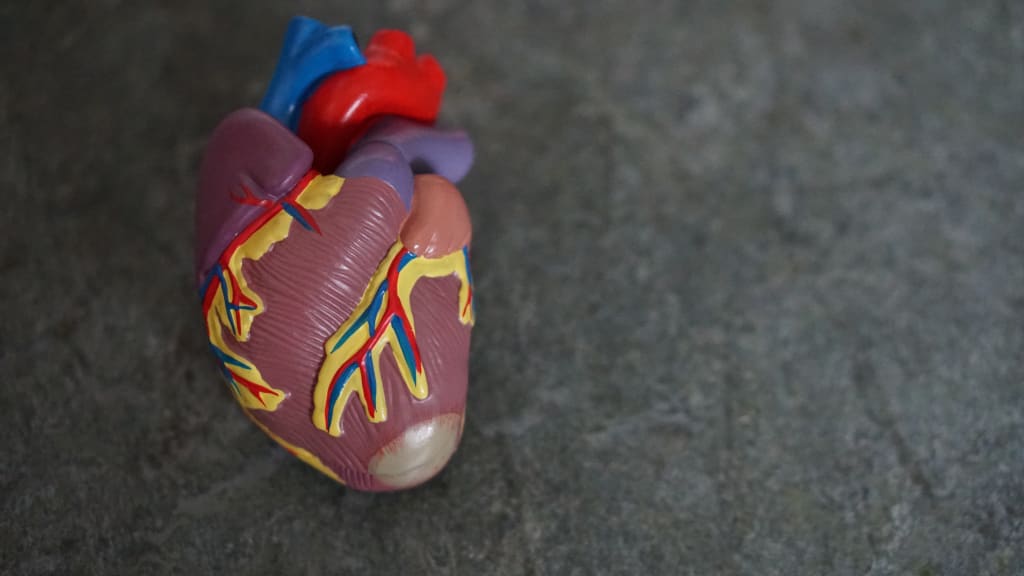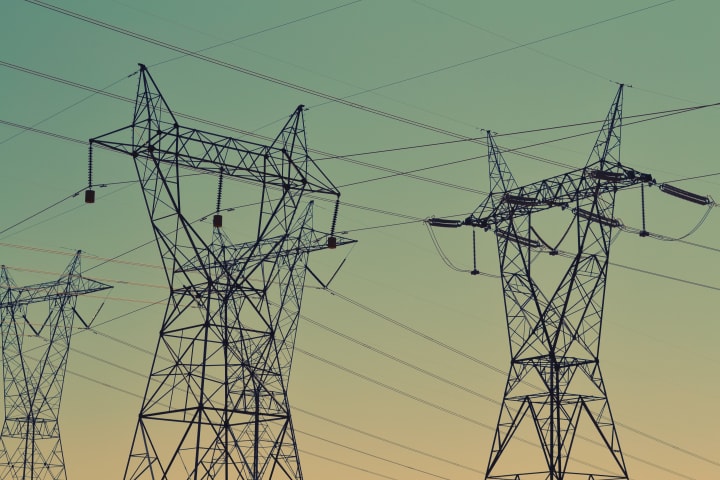A Matter of the Heart: Overthinking These Symptoms Alerted Me to a Real Problem
Don't ignore the signs that your body is trying to tell you something.

I’m convinced that, someday, I’ll die of a heart attack.
My family has a long and awful history of stroke, heart disease, and diabetes. All of my grandparents suffer from these afflictions, and three of them have sadly already passed away from them. My dad’s dad was a walking cautionary tale of why it’s important to take care of yourself, and specifically, why you should take care of your heart. Grandpa Bill was a big, strong, barrel-chested man. My dad is a big, strong, barrel-chested dude. And, genetics being what they are, I grew up to have the same build.
I also inherited the cardiovascular systems of my forbearers.
Grandpa Bill had two quintuple bypass surgeries.
Yes, QUINTUPLE bypasses.
Two of them.
For a long time, I didn’t even know one quintuple bypass was possible, much less a second. The doctors told him he had to take care of himself, as there was nothing left for them to bypass.
He eventually died of heart failure.
Luckily, my dad is still around, and, as far as I know, he’s still doing ok.
***
As I’ve gotten older, I’ve begun to notice little things here and there that make me wonder, “Am I ok?” A few mild chest pains here, a little tingly feeling in the left arm there. Nothing major, and nothing lasting longer than maybe half an hour, but enough that, coupled with my family history, I brace for something worse to happen.
Up to this point, nothing serious has happened. But the fear that something might happen is usually enough to trigger the overthinking centers in my brain, if not cause a full-fledged panic attack.
And if you’ve never had a panic attack, here’s a list common symptoms: chest pains, shortness of breath, tingling/numbness in the left arm, nausea, and feeling like you might pass out.
Sounds eerily similar to the symptoms of a heart attack, don’t you think?
I can tell you from experience, it feels like you’re having a heart attack.

***
Part of what causes my anxiety to run like Usain Bolt is that, having a damaged spinal cord, not all of my physical sensations are reliable. For example, my left hand and outer forearm sometimes get tingly when I’m tired, or if I’ve been pushing my wheelchair a lot that day. This doesn’t mean I’m having a heart attack. Rather, this is the result of the damaged nerve function that accompanies a spinal cord injury.
What exactly do I mean by damaged nerve function? Yes, it often means the inability to walk or a lack of sensation in your chest, abdomen, or legs. How much loss of motor function or sensation depends on your level of injury.
It can also mean that certain nerves can be triggered by sensations or stimuli that wouldn’t otherwise elicit a response.
In other words, some of the wires simply get crossed. For example, if I scratch the outside of my left hand, I feel a tingle in my left foot.
I know, it’s weird.
One of the therapists in the rehab hospital explained it in the following terms. Your spinal cord is like a power cable. While the cable is undamaged, the power goes where it’s supposed to, when it’s supposed to. But a damaged spinal cord is like a frayed power cable. Some of the power goes where it’s supposed to, but some of it shoots off in all different directions.

It’s the reason I get strange sensations in strange places (not a reference to puberty) as well as involuntary muscle spasms.
It’s also the reason why spinal cord injury patients suffer from nerve pain. If you’ve never experienced it (and I hope you never do), nerve pain often presents as a burning sensation. It can be localized or widespread, and its intensity, location, and frequency varies from person to person.
So when my chest hurts, I have to ask myself, is it an indicator of something serious, or is it my damaged nerves acting up?
Luckily, I’ve been a quadriplegic long enough that I can usually point to a cause of chest pain. I didn’t get enough sleep. I had too much coffee. I really need to pee — that can set off something called Autonomic Dysreflexia, which is the body’s inability to cope with a noxious stimulus, such as having an over-full bladder, and cause chest pain, headaches, accelerated heart rate, and elevated blood pressure and body temperature.
Other times, I haven’t been able to point to a cause, which is cause for concern. For example, I ended up in the hospital during my second semester of grad school because I was having severe chest pains, left-arm numbness, and quickened breathing. I remember driving to the hospital (yes, I drove myself. There was no one else home, and I was pretty sure I needed to go, but didn’t want to take an ambulance in case it turned out to be nothing), thinking, “I’m 32-years-old. Sure, I’m not in the best shape at the moment, but I eat fairly healthy, and I’m TOO YOUNG to have a heart attack!”
After two days in the hospital and about a dozen different tests, the doctors couldn’t find a cause for what had happened. All the tests came back negative. All the evidence the doctors had pointed to my very good health.
So what happened?
Their best guess was a severe anxiety attack…and even that wasn’t a diagnosis on which they were completely sold.
***
Cut to two years ago.
I started noticing that, several days a week, usually as I was driving out to track practice in the afternoon, I would get light-headed, a little dizzy, and feel like I just wasn’t getting enough air — not enough to induce full-on panic, but just enough to be noticeable and mildly concerning.

Those symptoms only lasted ten or maybe fifteen minutes at most. They were always gone by the time I got to practice. And once I was there, they never reappeared, even though I was rolling up and down the track.
But, as those symptoms persisted over weeks, then months, I began to worry more and more. I’d be driving to the track and start thinking, “Maybe something is actually wrong. I mean, my family history is riddled with cardiovascular problems. Maybe this is how it starts — something small enough to ignore at first, but grows into something life-threatening. Or, something that causes my heart to explode through my chest like the alien in that movie Alien.”
I also thought, “Well, the last time I was in the hospital for a heart thing, it turned out to be nothing. Plus, I was stuck in a hospital for two days, which meant I didn’t sleep for two nights due to the noise, the unfamiliar surroundings, and the constant probing.”
Side note: why is western medicine so concerned with filling our orifices? It’s like doctors and nurses think, “Oh, look, an opening. Well, we’d best plug that with something.”
I’m a human being, not a leaky bucket.

***
I dwelled on the recurring symptoms for weeks, and eventually, I grew tired of the internal shouting match which was deadlocked in a stalemate. I don’t know if it was battle fatigue or the overpowering desire for some simple peace and quiet, but something happened, and I can’t explain it.
The rational part of my brain broke through the anxiety, frustration, and countless possibilities I’d been mulling over on a near-constant loop. It finally piped up and said, “You’ve overthought this for long enough. To make it stop, make a doctor’s appointment. If there’s a problem, trained medical professionals can help you fix it. And if it’s nothing, you’ll gain the peace of mind of knowing that you won’t drop dead behind the wheel, endangering everyone else on the road.”
That was just crazy enough to work…the prospect of being stuffed like a Thanksgiving turkey notwithstanding.
So I got checked out.
That was when I was officially diagnosed with anxiety and depression (though waiting for those results was like wondering who was going to win the next Harlem Globe Trotters game). That was also when I went in for a cardiac stress test.
Turns out, when I’m at rest, everything is fine. Circulation is normal, heart rate is at a healthy pace, etc. But, the test showed when my heart is under stress, there was reduced blood flow to my heart’s apex, or the bottom-most tip. This could be indicative of a partial blockage in the LAD artery, which is the big artery that goes across the heart, providing it with the majority of its blood supply.
On a related note, the LAD artery is knick-named “The Widowmaker” because, according to the American Heart Association, if it gets completely blocked, “the survival rate following a widowmaker heart attack is only 12% when it occurs outside of a hospital or advanced care center.”[1]
That’s a legitimate cause for concern.
***
Unsurprisingly, my diagnosis is one I share with many people on both sides of my family. However, what did surprise me was that several people in my family reached out and let me know the kinds of things they did to manage the condition. Mostly, it was to exercise and eat fairly healthy. And if that wasn’t enough, there were several medications that could help. It was good to know what worked for them, and that they were all leading healthy, albeit less bacon-intensive lives.
I was also embarrassed at how long I let my anxiety run wild and how indecisive I was. I’m lucky the problem wasn’t more serious. I’m lucky that I have a doctor who is thorough and family who cares enough to share their experiences with me and offer their reassurance.
And, oddly enough, I’m lucky that my penchant to overthink eventually spurred the rational side of my brain to action. I guess it’s a case of the squeaky wheel or some other clichéd saying. So I supposed, in this instance, I should be grateful to my overthinking nature.
But only in this one particular instance.
***
If you liked this story and/or my writing, sign up for my email list to stay up to date on new stories, upcoming features, and cool news. “I’ll subscribe to that” is another helpful phrase I’ve learned. Just saying.
You can also follow me on Twitter, Instagram, Medium, and BitClout
***
Reference:
[1] “What is a Widowmaker Heart Attack?” University of Pittsburg Medical Center, Feb. 2020. Web. What is a Widowmaker Heart Attack? | UPMC (susquehannahealth.org)
About the Creator
Matthew B. Johnson
Just a writer looking to peddle his stories. TOP WRITER on Medium in Humor, This Happened to Me, Mental Health, Disability, and Life Lessons. C-5 incomplete quadriplegic. I love comic books, coffee, all things Dragon Age, and the 49ers.






Comments
There are no comments for this story
Be the first to respond and start the conversation.